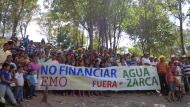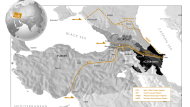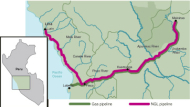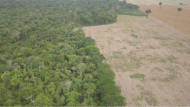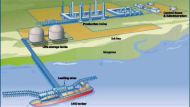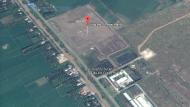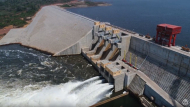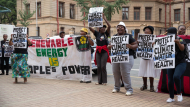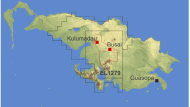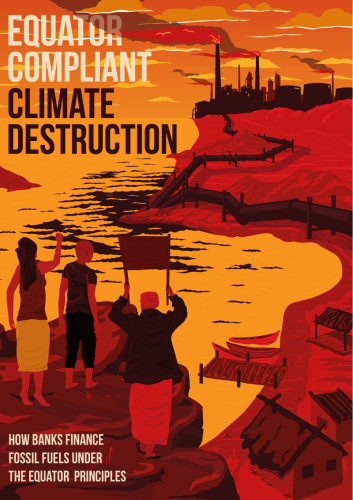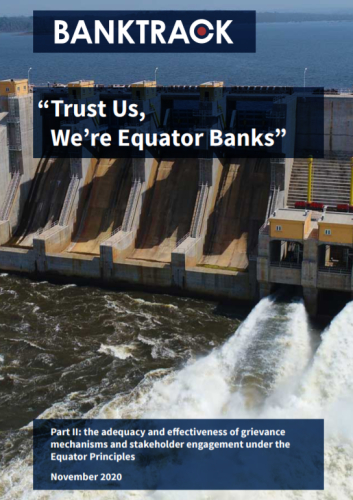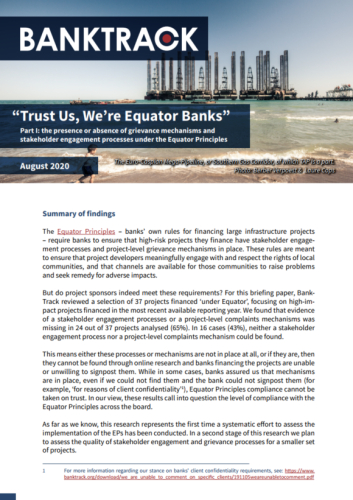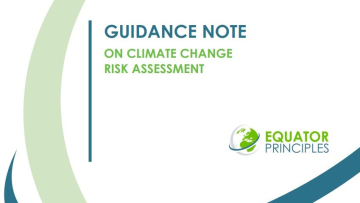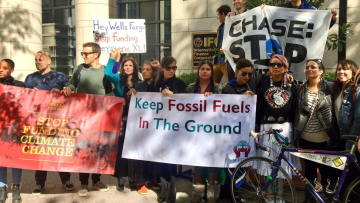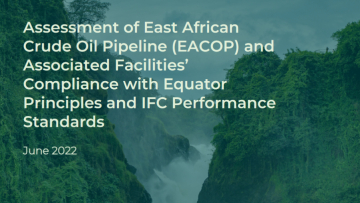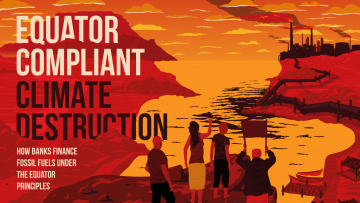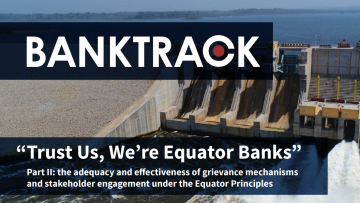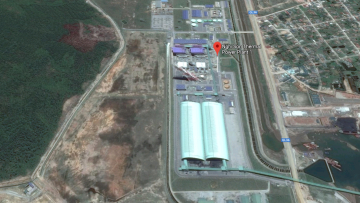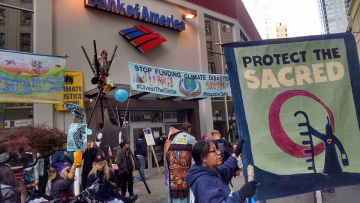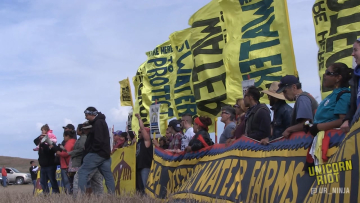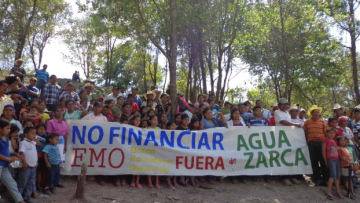Tracking the Equator Principles

The Equator Principles
The Equator Principles (EPs) are a risk management framework, created and adopted by financial institutions, for determining, assessing and managing environmental and social risks in financing projects. Currently, 138 Equator Principles Financial Institutions (EPFIs) in 38 countries worldwide have officially adopted the EPs. Since their introduction in 2003, the Principles have become the de facto standard for banks and investors on how to deal with potential social and environmental effects of large scale projects to be financed.
The EPs apply globally, to all industry sectors and to five financial products:
-
Project Finance Advisory Services (where total project capital costs are US$10m or more)
-
Project Finance (where total project capital costs are US$10m or more)
-
Project-Related Corporate Loans (under certain circumstances, e.g. where the EPFI’s total commitment is at least US$50m)
-
Bridge Loans (under certain circumstances)
-
Project-Related Refinance and Project-Related Acquisition Finance (from EP4, under certain circumstances)
For full details of the circumstances under which the EPs apply, see the ‘scope’ section of the Principles.
EPFIs commit themselves to implement the EPs in their internal environmental and social policies, procedures and standards for financing projects. According to the Principles, an EPFI will not provide finance services where the client will not, or is unable to, comply with the EPs.
The EPs consist of 10 Principles, summarised in the figure below.
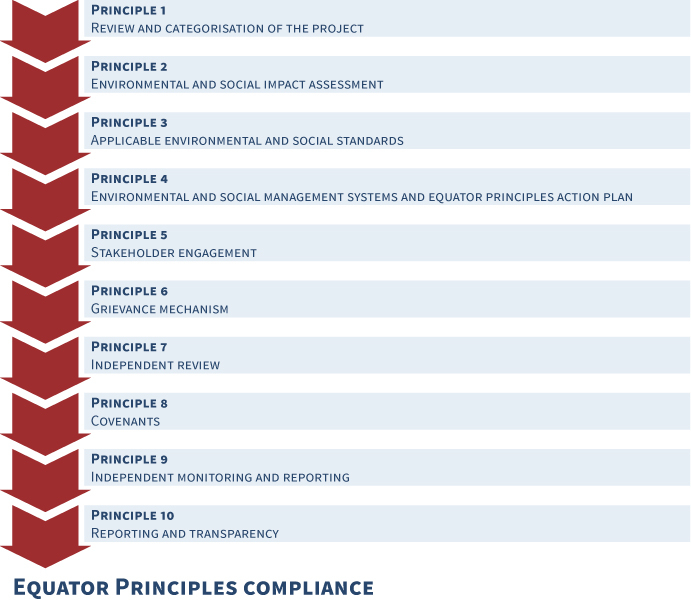
 The most recent version of the EPs is EP4, which was agreed upon in November 2019 and came into effect on 1st October 2020.
The most recent version of the EPs is EP4, which was agreed upon in November 2019 and came into effect on 1st October 2020.
BankTrack and the Equator Principles
Since the adoption of the EPs in 2003, BankTrack has acted as a watchdog on the EPs and their implementation. We have conducted analyses of projects financed ‘under Equator’ to examine their compliance with the EPs, and analysed aspects of EP implementation including reporting, transparency and project-level grievance mechanisms. BankTrack also led the “Equator Banks, Act!” campaign (see below), and continues to facilitate civil society engagement with the Equator Principles Association (EPA).
Compliance reporting: BankTrack has published reports analysing four Equator projects – the Rampal Coal-fired power plant project in Bangladesh; the Trans-Adriatic Pipeline project which runs through Albania, Greece and Italy; the Cirebon 2 Coal Power Plant in Indonesia; and the East African Crude Oil Pipeline (EACOP) in Uganda and Tanzania – highlighting how these projects are non-compliant with the minimum social and environmental standards established by the Equator Principles. In addition to these three projects, the BankTrack website includes Dodgy Deal profiles of numerous projects financed ‘under Equator’ that have significant human rights, climate and nature-related impacts which can be seen below.
“Equator Banks, Act!” Campaign: In 2017, following the financing by Equator banks of the Dakota Access Pipeline Project, BankTrack together with a coalition of civil society groups and Indigenous organisations launched the Equator Banks, Act! campaign, aimed at achieving a major overhaul of the Equator Principles which would stop Equator finance for new fossil fuel projects and protect Indigenous Peoples’ rights. While the campaign was instrumental in bringing about a revision of the Equator Principles beginning in 2018, the resulting EP4 did not achieve the campaign’s aims.
Reporting and transparency: In 2020, BankTrack analysed EP reporting requirements and engaged with the EPA to seek improvements on disclosure and transparency. Following this, we launched two tools to help track EPFIs reporting requirements under the EPs. The first is BankTrack’s Equator Principles project database which collects and displays the names of projects EPFIs have disclosed providing finance to under the Principles. The database was originally created because the data, which is available on the EP website, was not easily searchable and older data had been deleted from the website. In 2021, the EP Association published its own database of projects finance from 2020, which was a welcome improvement in transparency. We continue to update our own database particularly as, unlike the EPA database, it includes project data from 2014 to present day.
The second tool is a table that tracks EPFIs reporting status as per the requirements under the Principles. The table shows how many project finance transactions were reported and how many project names were reported for each EPFI in their most recent reporting period. Despite the requirement for EPFIs to publicly disclose the total number and names of projects they have provided project finance loans to under the Principles each year, project name reporting remains patchy. Project name reporting is subject to obtaining client consent, which often results in many project names not being publicly reported by EPFIs. We continue to engage with the EPA on reporting and transparency to advocate for further improvements.
Accountability and grievance mechanisms: BankTrack has called for greater accountability under the EPs since the start of the initiative. In 2019 we joined a call from 79 civil society organisations and partners for the Equator Principles to develop a central accountability mechanism. Since then, we have called upon the Association to improve accountability (among other things) in 2020, following our research into the implementation of Principles 5 and 6 on stakeholder engagement and grievance mechanisms; in 2021 as part of an open letter to the EPA and all EPFIs at their AGM; and in 2022 through another open letter that outlined civil society demands for the EPs ahead of their 20th Anniversary in 2023. The EPA committed to consider developing its own initiative level grievance mechanism when it released the latest version of the Principles in late 2019. However, since then the current Association chair has stated that this will not happen.
Stakeholder engagement and project-level grievance mechanisms: In 2020, BankTrack published two instalments of research analysing the implementation of Principles 5 and 6 on stakeholder engagement and grievance mechanisms. The first instalment analysed a group of 37 projects financed ‘under Equator’ in high-risk sectors such as oil, gas, mining and hydropower. It found that the existence of a stakeholder engagement process or project-level grievance mechanisms could not be evidenced in 24 out of 37 projects analysed (65%). In 16 cases (43%), neither could be found. The second instalment analysed the effectiveness and adequacy of stakeholder engagement and project-level grievance mechanisms under the Principles for a set of nine projects. This found that communities affected by projects financed under the Principles report that consultation is unsatisfactory and they are unable to seek redress through effective accountability mechanisms. The report includes concrete recommendations for the EPA and EPFIs on how to improve the implementation of Principles 5 and 6.
Climate, nature, pandemic and human rights risk assessment: BankTrack continues to advocate for the Principles to expand its concept of risk to include the risks projects financed ‘under Equator’ pose to the climate, to nature, to increased future pandemics and to human rights violations. Most recently, in an open letter to the EPA and all EPFIs ahead of their 2022 AGM, BankTrack and WECAN formulated clear commitments that need to be made by the Equator Principles before their 20th anniversary in June 2023. These include an end to the financing of fossil fuel projects and of projects located in highly biodiverse areas under the Principles, the full respect and protection of human and Indigenous rights, requirements for ‘pandemic risk assessment’ and establishing an initiative-level grievance mechanism.






